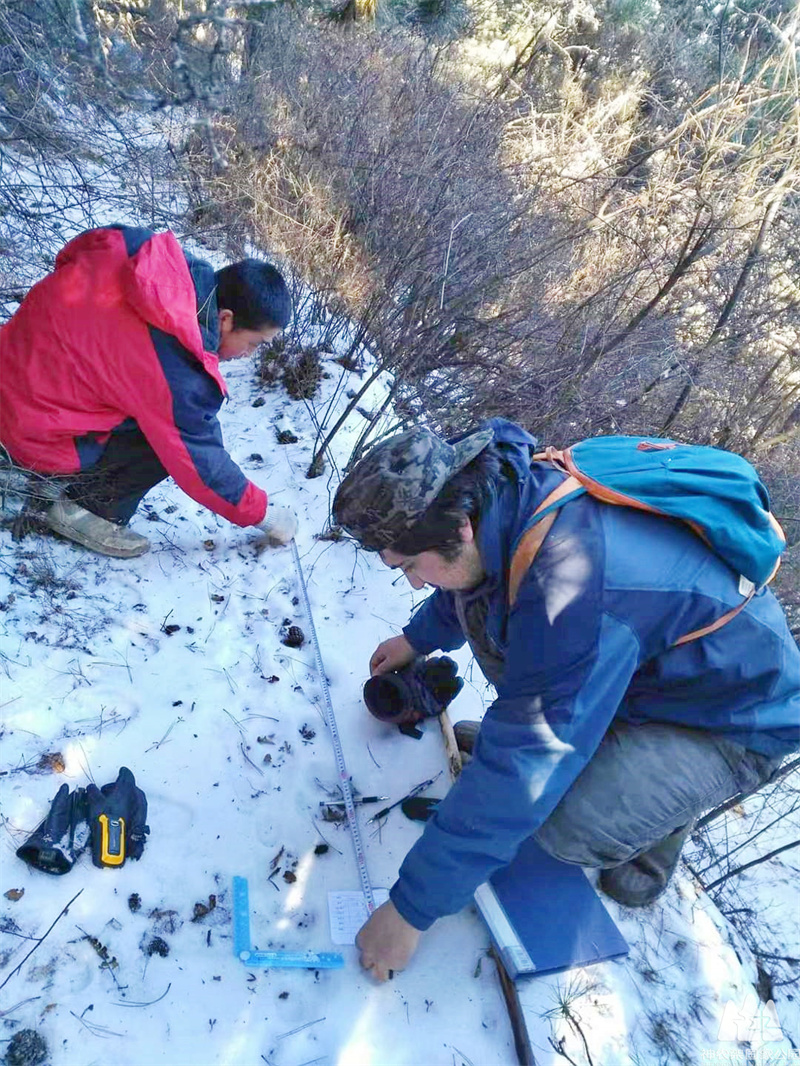Dr. Zaman: Repaying China's Generosity Through Wildlife Conservation
Updated:2024-02-04 Source:Shennongjia National Park
My journey to Shennongjia, a stunning winter wonderland at 31 degrees north latitude, was nothing short of magical. Despite the snowfall having ceased days before our arrival, the "Roof of Central China" was still blanketed in a pristine white snow, with its peak, Shennongding, glistening in ice and snow.

As we ventured into the mountains to capture the beauty of the winter landscape, we learned about a foreign researcher studying golden snub-nosed monkeys. At the Dalongtan Golden Snub-nosed Monkey Research Base, a Pakistani doctor specializing in the study of urinary C-peptide and behavior in golden snub-nosed monkeys caught our attention. He was the first to venture into this field of research on the Shennongjia Golden Snub-nosed Monkey.
On January 30, full of expectations, we set out to meet this foreign researcher at Dalongtan. In the afternoon, after observing and photographing the monkeys at the research base, we found the doctor taking samples deep in the mountain. We engaged in a fascinating conversation with Dr. Muhammad Zaman in a quaint pavilion by the roadside.

Dr. Zaman, known by his Chinese name 扎慢, pronounced Zhaman, works tirelessly at an altitude above 3000 meters, collecting urine from golden snub-nosed monkeys multiple times a day for vital research. The urinary C-peptide plays a significant role in glucose absorption, utilization, and storage, serving as a key hormone regulator for energy balance in the brain. Through analyzing physiological indicators like C-peptide levels in the monkeys' urine, he delves into the correlation between C-peptide levels and various factors such as energy balance, weight fluctuations, food sources, seasonal fruit availability, dominance hierarchy, age, gender, reproductive status, diseases, and habitats.

By understanding the intricate interactions between natural threats, nutritional challenges, and behavioral patterns of golden snub-nosed monkeys, Dr. Zaman aims to develop a comprehensive protection strategy to ensure the long-term survival and well-being of this endangered species. He is dedicated to contributing to wildlife conservation efforts in China, in gratitude for the country's unwavering support and generosity.
Having graduated from Northeast Forestry University in Harbin in 2022, Dr. Zhaman is currently a post-doctoral researcher at Central South University of Forestry and Technology in Changsha. Not only is he proficient in standard Chinese, but he also speaks fluent Northeastern Mandarin and the Changsha dialect. Dr. Zhaman hails from the mountainous region of northern Pakistan, where his deep connection with wildlife began during his childhood. His passion for wild animals led him to make a life-changing decision at the age of 12 - to dedicate himself to studying and protecting them. Throughout the years, Dr. Zhaman has engaged in wildlife research globally, visiting over 20 protected areas thus far. His mother's lineage can be traced back to Xizang, China, and his father has made numerous trips to China's Xinjiang region. Consequently, China holds a special place in his heart due to these familial ties and positive experiences. Acting on his father's advice, he journeyed to China to pursue a doctoral degree upon completing his master's studies in Pakistan.

To date, Dr. Zhaman has authored 16 scholarly papers, showcasing his remarkable academic accomplishments. Securing a work visa based on his outstanding achievements, he has chosen to remain in China to further his research and teaching endeavors. When questioned about his research on golden snub-nosed monkeys in Shennongjia, he expressed his desire to give back to China for the opportunities he has received - including a scholarship from the Chinese government and mentorship from esteemed professors Xiang Zuofu and Jiang Guangshun. Dr. Zhaman aims to contribute to China's wildlife conservation efforts as a way of showing gratitude for the support he has received in advancing his academic career within the country.
He delved into a plethora of literature regarding the golden snub-nosed monkeys, only to discover a significant gap in the global research pertaining to this endangered species. With determination in his heart, he embarked on a journey to bridge this void. Drawing inspiration from an age-old Chinese proverb, he firmly believes in the value of teaching sustainable methods rather than temporary solutions (Learning how to fish is more rewarding than simply eating fish. Let's delve into the art of fishing and appreciate the process more than the end result of just consuming the catch). His ultimate goal is the preservation of the golden snub-nosed monkeys through the study of advanced scientific conservation techniques.
Despite the harsh conditions of the cold, unforgiving mountains of Shennongjia, he persevered day after day in his quest to collect fecal samples from the elusive creatures. On occasion, he found himself under a golden snub-nosed monkey's tree during an unexpected urination, resulting in a rather unpleasant encounter. Nevertheless, he recounted these experiences with unwavering honesty, devoid of any hint of complaint or embarrassment.
At the Dalongtan base, home to 76 golden monkeys, he has developed an intimate knowledge of each individual. He can identify them by their unique features, from moles to relationship status, and he even knows their names and ages. Such meticulous attention to detail is not just a requirement for serious scientific study, but also a source of joy and fulfillment for him.
Dr. Zaman is deeply passionate about his career and life in China. Despite being in Shennongjia for just a month, the warmth and friendliness of the people he has encountered have made a profound impact on him, with some even becoming close friends.
Dr. Zaman holds a deep admiration and appreciation for Chinese cultures and its people. His love for their traditions and beliefs is apparent in all his interactions.He enthusiastically shared his plans to conduct research on Yunnan golden snub-nosed monkeys in March next year, as well as studying North China leopard corridor connections, black bears, and other wildlife species.
Wildlife conservation is a global effort that requires collaboration from around the world. With China's vast territory, protecting its wildlife is a monumental task. Dr. Zaman's dedication to scientific inquiry is truly admirable and serves as an inspiration to us all. We wish him great success in his research endeavors and eagerly anticipate the valuable insights he will provide in the near future.
Copyright Shennongjia National Park
Address:36 Chulin Road, Muyu Town, Shennongjia Forestry District, Hubei Province 鄂ICP备18005077号-3
Address:36 Chulin Road, Muyu Town, Shennongjia Forestry District, Hubei Province 鄂ICP备18005077号-3
Email:2673990569@qq.com
Phone:0719-3453368
Phone:0719-3453368


TOP

